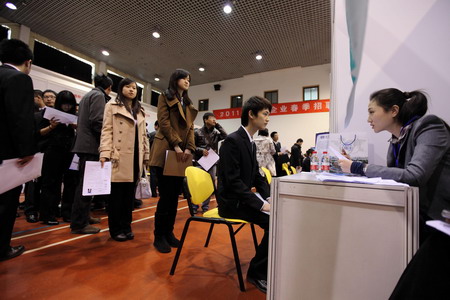Economy
Grads looking past Beijing
By Wang Wei (China Daily)
Updated: 2011-03-14 14:16
 |
Large Medium Small |
|
 |
|
Students line up for an interview during a job fair at the University of International Business and Economics on March 11. [Photo / China Daily] |
A recruitment drive last Friday at the University of International Business and Economics (UIBE), where just 12 of the 102 companies on show were from outside Beijing, saw employers from Qingdao and Hangzhou cities and Sichuan province outstrip those based in the capital for applications.
About 35 percent of the UIBE's 3,300 graduating students are expected to land jobs in China's so-called second- or third-tier cities, up from 20 percent in previous years, said Chen Jianxiang, the university's deputy Party secretary.
Li Zhiping, 22, was among the 40 or so smartly dressed people lining up in front of a booth for Taiyuan Iron and Steel Co Ltd, which is headquartered in the central Shanxi province. The firm received up to 400 applications during the fair.
"The average salary for university graduates is about 3,000 yuan ($446.10)," said the international trade major, who complained that it has become too difficult to live in Beijing after new policies to restrict home and vehicle purchases. "With the staggering house and rental prices, I can barely rent an apartment, let alone to buy one.
"Although I've spent a wonderful four-year college life in Beijing, with the restrictions I don't feel a sense of belonging in the city anymore," he told METRO.
| ||||
Graduates say that going to smaller cities will present them with more opportunities for career development.
"Many large companies in other provinces value graduates who received education in Beijing," said Liu Ying, a 22-year-old majoring in business administration at UIBE. "This means I'll enjoy a lower pay threshold but better career development opportunities."
Companies in second- and third-tier cities are wasting no time in taking advantage of the new trend among Beijing university graduates.
"We plan to recruit 1,200 people this year, and many of them will be from big cities like Beijing and Shanghai," said Zhao Lu, human resources manager at TBEA Cable Company in the Xinjiang Uygur autonomous region, which has held campus recruitment drives at capital colleges for four years.
Zhao said more than 150 students showed up at Beijing University of Chemical Technology's 100-seat auditorium for a recent job fair. Last year, it was just 50 students.
Educators said fierce competition and better development opportunities elsewhere mean Beijing is becoming less attractive to job hunters.
"Nowadays, students are more realistic," said Wang Ling, Party secretary at the UIBE. "They choose smaller cities because they sense Beijing has become too competitive, while smaller cities have more development potential."
"I always encourage students never to turn their back on private-owned enterprises and companies outside Beijing. They are the ones expanding swiftly and providing more opportunities," she added.
| 分享按钮 |



